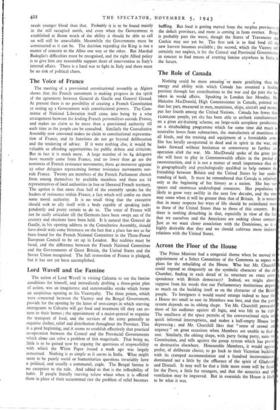Lord Wavell and the Famine
The action of Lord Wavell in visiting Calcutta to see the famine conditions for himself, and immediately drafting a three-point plan of action, was an imaginative and statesmanlike stroke which forms an auspicious opening to his Viceroyalty. The three points, which were concerted between the Viceroy and the Bengal Government, provide for the opening by the latter, of rest-camps in which starving immigrants to Calcutta will get food and treatment till they can re- turn to their homes ; the appointment of a major-general to organise the transport of food, and the services of the army generally to organise shelter, relief and distribution throughout the Province. This is a good beginning, and it seems to establish effectively that practical co-operation between the Central and the Provincial Governments which alone can solve a problem of this magnitude. That being so, little is to be gained now by arguing the questions of responsibility with which the White Paper issued a week ago was largely concerned. Nothing is as simple as it seems in India. What might seem to be purely social or humanitarian questions invariably have a political, and usually a communal, angle. The Bengal famine is no exception to the rule. And added to that is the inflexibility of habit. If people literally starving refuse wheat when it is offered them in place of their accustomed rice the problem of relief becomes
baffling. But food is getting mpved from the surplus provinces to the deficit provinces, and more is coming in from oversea. Bengal is probably past the worst, though the States of Travancore and Cochin may not yet be. The first task is to find food till the new harvest becomes available ; the second, which the Viceroy will certainly not neglect, is for the Central and Provincial Governments in concert to find means of averting famine anywhere in India in the future.


























 Previous page
Previous page